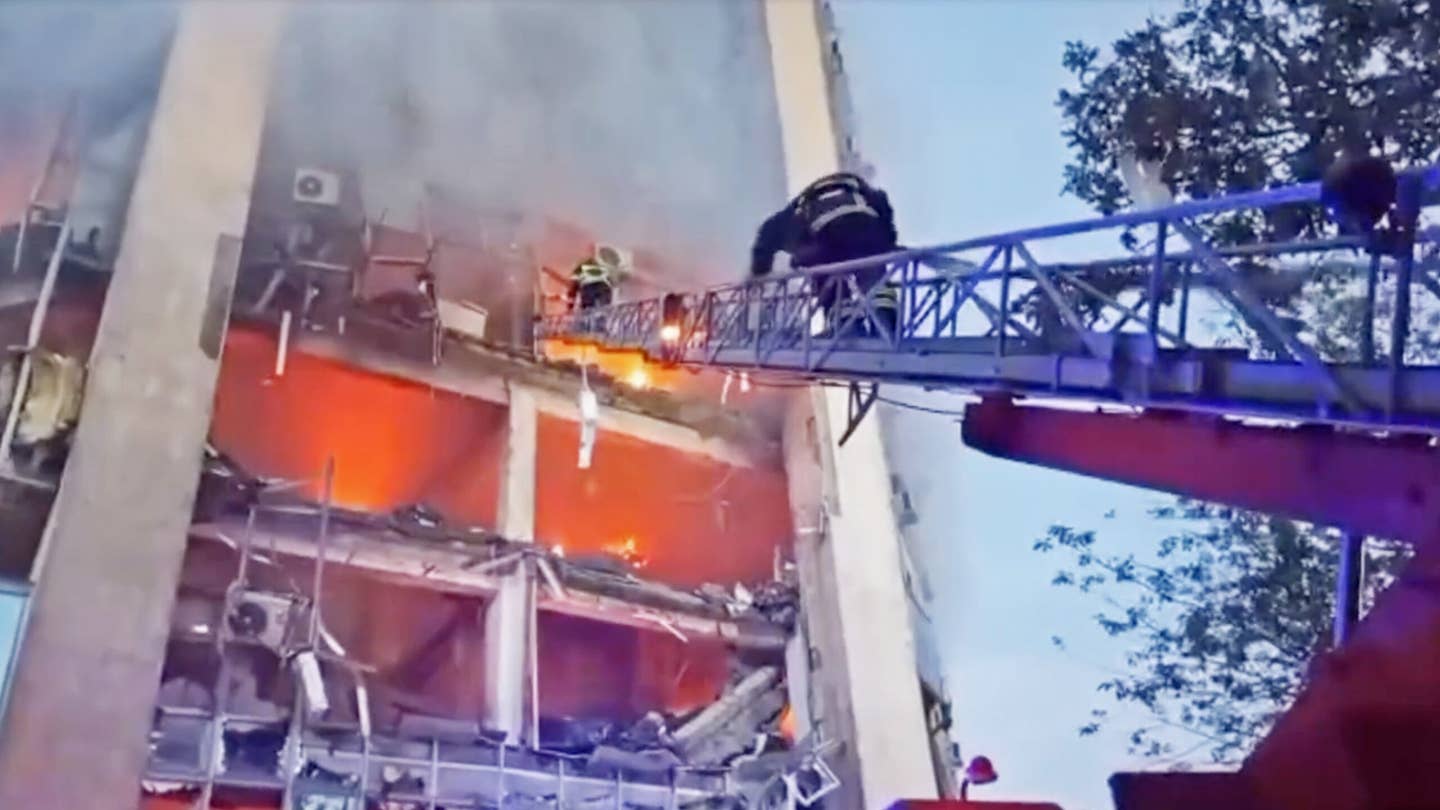Russia Hammers Key Ukrainian Inland Port Of Izmail
The port of Izmail, on the Danube River right across from Romania, is the latest grain infrastructure to be attacked by Russian drones.

Russia has struck its next blow in the deepening ‘grain war’ against Ukraine with an attack on the port of Izmail, on the Danube River, in the country’s Odesa region, early this morning. Ukrainian authorities claim that 40,000 tons of grain were destroyed in the strike and global markets responded rapidly, with the Chicago wheat price driven up nearly five percent in its aftermath.
Soon after the attack, publicly available ship-tracking data revealed dozens of ships waiting at anchor at the mouth of the Danube, many of them bound for Izmail.
Just yesterday, The War Zone previously reported on how several international ships were already noted headed toward the port in recent days, openly announcing their destination via automatic identification system (AIS) tracking.
Any ships doing this are breaching the de-facto blockade reimposed by Russia earlier this month and could have served as the trigger for the raid on the port.
Speaking at a media briefing, Natalia Humeniuk, head of the Joint Coordination Press Center of Ukraine’s Southern Defense Forces, stated that “These vessels were sailing in accordance with international recommendations through the territorial waters of other countries. But the enemy’s goal is to show shipowners that any ports in Odesa region are dangerous.”
The attack on Izmail’s port infrastructure reportedly involved Iranian-designed Shahed-type drones. Serhiy Bratchuk, the head of the Odesa regional military administration, said that 11 Shaheds were shot down during the latest wave of attacks in the south of the Odesa region.
Odesa’s regional governor, Oleh Kiper, said there were no reports of casualties.
Reports indicate that the raid destroyed buildings and prevented ships from entering the port to load up with Ukrainian grain. Videos show firefighters tackling a major conflagration in a high-rise building, while other buildings were in ruins or had their windows blown out. At least two wrecked grain silos can also be seen.
According to Ukraine’s Deputy Prime Minister Oleksandr Kubrakov, the Russian attack on Izmail targeted almost 40,000 tons of grain “which was expected by the countries of Africa, China, and Israel.”
Izmail is home to Ukraine’s main inland port and is also located very close to Romania, on the other side of the Danube, raising the prospect of involving that NATO-member nation more deeply in the conflict.
Romania’s President Klaus Iohannis said that Russia’s attacks on Ukraine’s Danube infrastructure across from Romania were “unacceptable.”
“These are war crimes and they further affect [Ukraine’s] capacity to transfer their food products towards those in need in the world,” Iohannis said.
In the past, Danube river ports accounted for around a quarter of Ukrainian grain exports, with shipments normally being taken by barge to Romania’s Black Sea port of Constanta for onward movement.
With the Russian blockade in force on Ukraine’s Black Sea ports, Izmail has provided the best alternative route for getting grain exports out of Ukraine. Most recently, Kyiv had hoped that international ships could be loaded with grain in Izmail and then follow the Danube to the Black Sea, without having to unload in Romania.
“Russian terrorists have once again attacked ports, grain, and global food security,” President Volodymyr Zelensky said on the Telegram messaging app. “The world must respond. When civilian ports are targeted, when terrorists deliberately destroy even elevators, this is a threat to everyone on all continents. Russia can and must be stopped,” Zelensky added.
Condemnation also came from U.S. Ambassador to Ukraine Bridget Brink, who listed the kinds of targets Russia is now attacking: “Homes. Ports. Grain silos. Historic buildings. Men. Women. Children.”
Brink continued: “Round-the-clock and intensifying Russian strikes on Kryvyi Rih, Kharkiv, Kyiv, Kherson make it clear once again Russia has no desire for peace, no thought for civilian safety, and no regard for people around the world who rely on food from Ukraine.”
Earlier today, unnamed industry sources told the Reuters news agency that operations at the port were still suspended. However, the head of the port authority, Yuriy Lytvyn, took to Facebook to say that repair work had already begun and that at least some elements of port infrastructure were still working.
Last week, another Ukrainian port on the Danube, Reni, was also hit by a Russian strike, as you can read about in our reporting at the time. The July 24 attack apparently also involved Shahed drones and resulted in damage to port infrastructure, according to regional officials.
The attack on both these ports represents the next step in a widening Russian campaign directed against Ukraine’s agricultural and port infrastructure, with the aim of stopping Ukraine from exporting grain. These attacks have been kept up now for around two weeks, ever since Moscow refused to extend the agreement under which its blockade of Ukrainian ports was lifted, allowing Ukraine these exports, which are vital to its economy.
According to Ukrainian officials, 26 different port facilities have been hit by Russian strikes, together with five civilian vessels, while almost 180,000 tons of grain have also been targeted so far.
The effects of the latest strikes were keenly felt by international markets. Although the aforementioned Chicago wheat price increase of almost five percent had reduced to 1.2 percent by around midday today, GMT, there’s still concern about the longer-term security of global supplies. Other food prices leaped up, too, today, with the cost of maize climbing more than two percent, and soyabean oil prices rising 0.3 percent.
With Ukraine having been one of the world’s largest grain exporters, the United Nations has warned of the potential for food crisis and famine in some of the world’s poorest countries as a result of Russia’s actions.
Russia, however, stands by its actions, describing the latest attacks on Ukrainian grain infrastructure as a response to the recent Ukrainian strike on the Kerch Bridge that connects Russia with Russian-occupied Crimea.
The Kremlin has also repeated its demands for an improved deal covering its own exports of food and fertilizer. As part of the earlier grain deal, Russia had been exempt from sanctions on these exports. Although this situation continues, Moscow is still attempting to use the parallel nature of the original deal to justify its actions.
The original grain deal was brokered by the United Nations and Turkey and Russia’s President Vladimir Putin has spoken by telephone to his Turkish counterpart Tayyip Erdogan. However, any possibility of Putin visiting Turkey to renegotiate the deal appears unlikely, with the Russian leader wanted by the International Criminal Court for war crimes.
Whatever the outcome of potential talks around resurrecting the grain deal, for the time being, at least, the Kremlin considers Ukraine’s agricultural and port infrastructure to be a legitimate target. As long as the blockade and accompanying attacks continue, the effects will be felt not only by Ukraine but also by the wider global community.
Contact the author: thomas@thedrive.com
